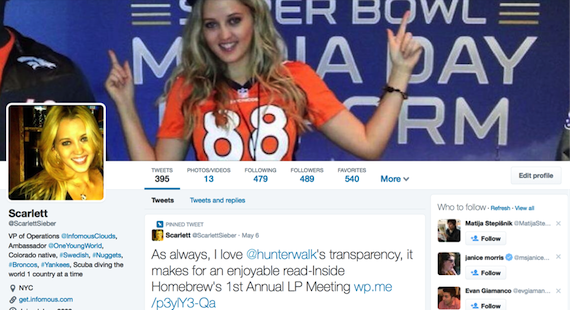There has been a lot of news about Twitter in the last few weeks, most recently the post from The Atlantic, "A Eulogy for Twitter." The article argues that although Twitter's users are increasing, their users are less active. Others have pointed out that this is not a fair comparison, and I agree with those authors. From my personal experience, I have found some other great benefits of working with Twitter that are not available on other social platforms.
Most recently, my company, Infomous, was in the middle of looking for funding, and I was tasked with putting together a list of potential investors. I decided to follow the investors we were interested in talking to on Twitter to see if I could learn a bit more about them when we went into meetings. Every day I would go to my Twitter account and read the tweets these investors wrote. I started noticing that while a majority of their tweets were business related, their personalities started to shine through their tweets as well. I found that I had many similarities with them, music I listened to, activities I enjoyed (biking, scuba diving), etc. These investors no longer seemed like these untouchable beings; instead they became regular people that I could connect to.
After I read enough of their posts I started actively responding to their tweets with insightful comments, and to my surprise, they actually responded! I chose to focus some of the initial responses on personal tweets as opposed to business and that helped establish a relationship. I think it also helped because they felt more comfortable opening up. I went into every conversation thinking, "What can I offer this person?" So for example, if an investor tweeted about a rap song, I would respond with a few of my favorites to see if they had heard of them. I also made it a point to tweet any of their articles that I found particularly insightful and take the one sentence that stood out to me the most and use that as the subject of my tweet. The investors appreciated this because it showed that I actually read the article and that I was a champion for them, endorsing their ideas to others. Investors also appreciated this because it showed some of the specific ideas that were resonating with people.
After a few weeks, prominent investors started following me (a handful of whom I did not even follow). I was getting direct messages from these individuals telling me how insightful my comments were and how they appreciated my endorsement of their articles. I was getting direct messages like, "Your posts are spot on and knowledgeable, very rare to find a younger person who follows the space," and many others like this. I could now go into investor meetings with a real understanding of their background, not just what was on their bio page. When showing examples of our product, I could incorporate examples that were relevant to them and therefore would stick with them.
But Twitter is great for so much more than just connecting to people in your sector. It helps you stay abreast of trends as well. In the investor community, for example, you can see what types of companies are getting funded and at what stage, which is invaluable information. It is also great for job searches. Many times, potential employers will post job openings on their Twitter as the candidates who actively read their feed are the type of candidates they are interested in hiring because they obviously have a passion for the company. Hiring in general has shifted more towards social media and very prominent firms like Union Square Ventures are using Twitter as a means of getting to know potential candidates. Reading through a candidate's tweets gives an employer a good idea of how that individual thinks and what types of things/ideas they are passionate about; a lot more than a traditional resume.
Twitter makes it easier to gain insights into people even when they are not yet part of your social network and it is here to stay.
